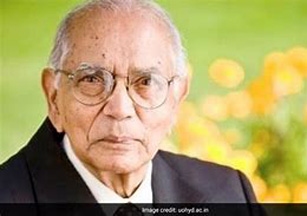
NEW YORK (TIP: Named ‘a living legend’ of statistics, Indian American mathematician and statistician Calyampudi Radhakrishna Rao, popularly known as CR Rao, has died at the age of 102.
The man with many titles, from ‘Legendary Mathematician’ and ‘Statistics Professor’ to a ‘Rockstar’ in the field of statistics, CR breathed his last in Buffalo, New York on August 22, just 18 days before his 103rd birthday.
Tributes and condolences poured in from peers, friends, and family at his passing on social media commemorating his monumental achievements in the field of statistics.
In May, Rao, a research professor in the Department of Biostatistics, School of Public Health and Health Professions at the University of Buffalo since 2010, added another accolade to his long list of awards as the winner of the 2023 International Prize in Statistics, considered the Nobel Prize for the field.
In announcing the award, the International Prize in Statistics noted Rao’s “work more than 75 years ago continues to exert a profound influence on science.” It added.
“In his remarkable 1945 paper published in the Bulletin of the Calcutta Mathematical Society, Calyampudi Radhakrishna (C.R.) Rao demonstrated three fundamental results that paved the way for the modern field of statistics and provided statistical tools heavily used in science today,” it added.
“In awarding this prize, we celebrate the monumental work by C.R. Rao that not only revolutionized statistical thinking in its time, but also continues to exert enormous influence on human understanding of science across a wide spectrum of disciplines,” said Guy Nason, chair of the International Prize in Statistics Foundation.
He was also awarded the Padma Bhushan in 1968, Padma Vibhushan in 2001 and SS Bhatnagar Award. He also received the Wilks Medal of the American Statistical Association in 1979 and the US National Medal of Science in 2002.
Rao was born on September 10, 1920, to a Telegu family in Hadagali, Bellary, Madras Presidency (now in Karnataka) to politician mother A. Lakshmikanthamma and policeman father C. Doraswamy Naidu.
Unlike most kids, mathematics as a subject was not scary for him. In fact, by the age of 5, he had memorized multiplication tables up to 16 with adroitness.
His early schooling was conducted in Gudur, Nuzvid, Nandigama and Vishakhapatnam. He received an MA in mathematics from Andhra University, followed swiftly by an MA in statistics from Calcutta University in 1943.
He then obtained a PhD from Cambridge University in 1948, with a thesis titled “Statistical problems of biological classification.”
His work spanning seven decades contained enormous advances in anthropology, chemistry, econometrics, geology, biology, psychology, social sciences and national planning.
In particular, physics has his well-known Hiesenberg’s Uncertainty Principle. The Rao-Blackwell theorem is considered some of his best work. He published 14 books, over 400 journal publications and received 38 honorary doctoral degrees from universities.





Be the first to comment